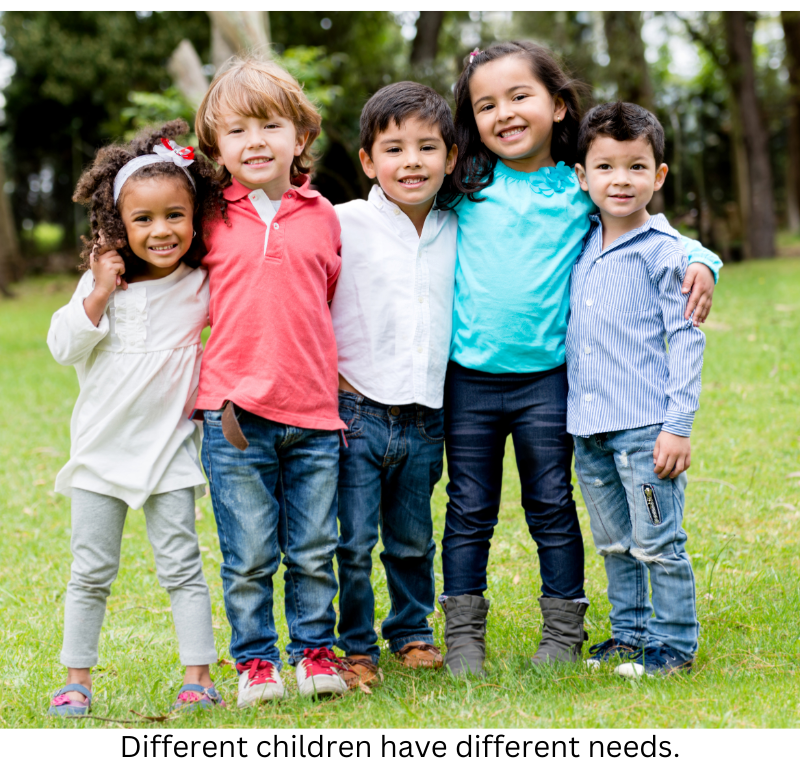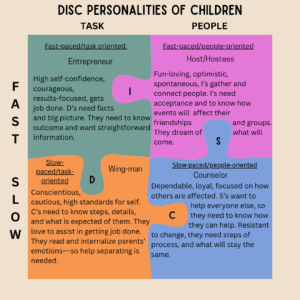“Jan and I are telling the children tonight,” Rob told Joe. “I don’t even know how to begin. What did you and Sally say?” Joe grimaced and shared he couldn’t help much. They didn’t know what to say, and the children took it so differently. He wished he had a do-over. For Joe’s do-over and for all parents who want to get the message right—they can help children by telling the children about divorce with DISC.
What is DISC?
DISC is a model for understanding differing personality/behavioral styles in people. Understanding each child’s style helps parents know:
- which information will be most important to each child,
- how to better communicate that information,
- what each child’s primary concerns may be, and
- how each child may best process and cope with the changes divorce brings.
The model uses the spectrums of pace and focus. People fall on a spectrum from innately fast to slow-paced and on a spectrum of innately task to innately people-focused. It looks something like this:
How can DISC help us tell our children about divorce?
Almost no one fits solely in one quadrant. People tend to fall along a spectrum, but are internally wired to approach life with a dominance of one or two styles. Understanding where each child falls helps parents know what information each child will need to hear and what options you can offer each child to help them cope.
What all children need—All children need to hear the basic messages of “We have decided to divorce. We need you to know:
1) We love you;
2) We are going to take care of you;
3) This is not your fault—this was our decision.
The “our” (even if one of you doesn’t want the divorce) affirms that parents are working together. More, it keeps children from feeling they must defend either parent or become the buffer to keep parents happy.
Once parents share these messages, the rest of the information can be tailored to the style of each child.
D—children D’s will need the facts—but as a big picture—i.e. who will be moving when, where will you live, what happens with school. Long explanations may be harder for them, so you may need to help them be patient with details for other children who need those. Also, plan for shorter topic-focused talks with the D’s as plans unfold.
Born leaders, it may help D-children cope by giving them roles where they can take the lead. For example, if moving younger children may respond to, “We will need your help knowing which toys to pack early and which to keep out.” Older children may appreciate, “I’d like your input on possible housing options.”
Giving places to take charge as the process moves forward will play to a D’s strengths and help them feel less “out-of-control.” D’s like achieving goals. Your acknowledgment of their help as they complete key tasks will keep affirmation (and security) going.
I—children I’s are talkative, spontaneous, and optimistic. So, they may need to talk more about what is happening in order to process. They may also be more vocally hopeful about what is coming—which may encourage siblings or may make them feel pressured to feel what they don’t yet feel. Parents may need to normalize that different children will feel differently, and that’s ok.
Fear of rejection is an I’s greatest fear, so helping them know how to stay connected to both parents is huge. More, they may fear rejection by peers and others when they share news that their parents are divorcing. Being ready to help them navigate those questions may be key.
Finally, details are hard for I’s. Letting the I-child know you will write down changes, parenting schedules, and what to take from house to house will increase security for them.
S-children S’s tend to focus on deep relationships. They are committed to helping and serving others, struggle with change, and may need time to process the news.
Your S child will likely need to talk to parents—but later. S children take a while to process information. They will also need time to plan how they will cope.
S’s often focus on helping parents and siblings—so giving them ways to do so will help them cope. The coming changes may be their biggest struggle. Parents being aware of the huge difficulty of change for S’s may lead to more empathy. Also, offering step-by-step plans of how changes will unfold (as parents can) will help tremendously.
Even more, relationships matter hugely to S’s. Being available for conversations and finding ways to connect will get the S-child through.
C-children self-disciplined, intuitive, and analytical—C’s will focus on details. They are often quiet, need to think through new developments, and will process analytically.
Unlike D’s who just want the big picture and will “wing it” or S’s who will want a step-by-step plan to know how to support others, C’s want a step-by-step plan to process their own responses and plan for action.
A C’s intuitive side will have them often accurately reading parents and siblings emotions, and they will likely form opinions on how to help “in the right way.” Letting them offer input on details plays to a C’s strengths and affirms them. As changes come, giving C’s time to process and avoiding sudden adjustments or whims will increase their security.
Telling children their family is changing is never easy. Yet, you ease the news when you assure your children you will work together to care for them.
Parents keep this promise to work together by sharing the news tailored to what each child will need to know and allowing each to process in the different ways they need.
For more information on parenting to each child’s style, consider Different Children, Different Needs or Personality Insights for Moms (Dads can benefit, too!).
Finally, know—this isn’t one conversation. There will be many opportunities to talk with and support your children. Much more important than the one conversation is the ongoing support you give as everyone moves forward..
If you would like more information on navigating divorce with children, contact Resolution Mediation by clicking HERE or calling 317-793-0825 and ask for information on Marital Mediation. We look forward to serving you.
As always, the above is for information only. Seek a divorce professional for guidance in your personal situation.




